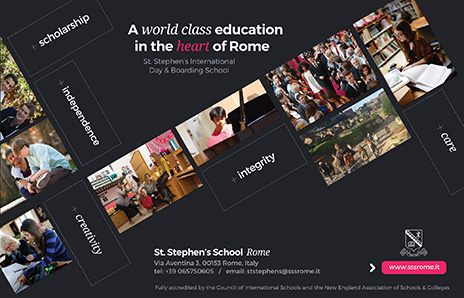2022 Award for Lifetime Contributions to American Diplomacy: A Conversation with Anne W. Patterson
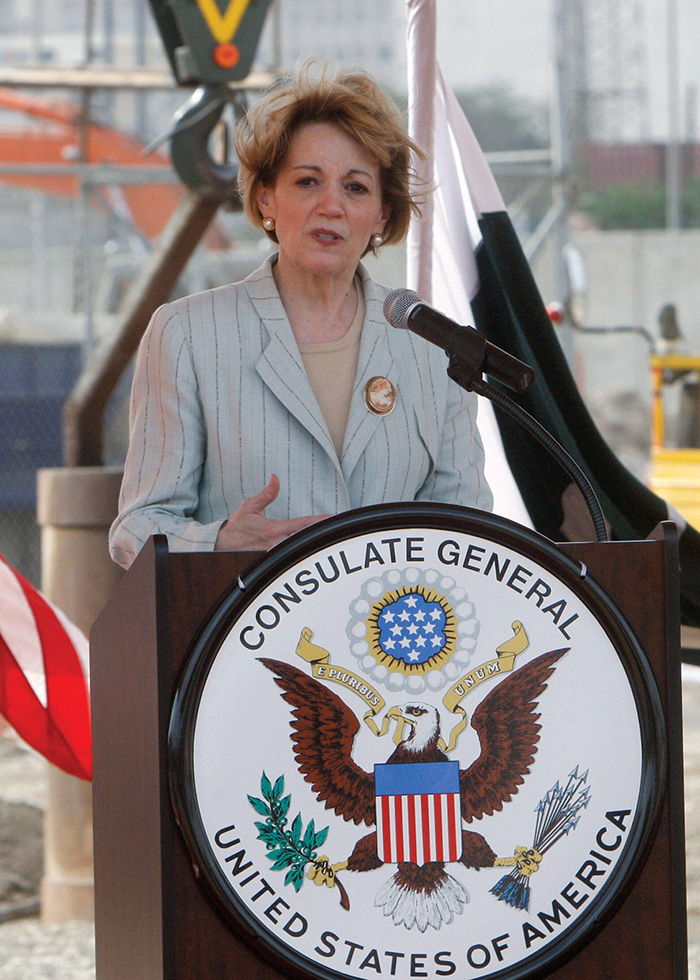
Ambassador to Pakistan Anne Patterson speaks at a ceremony launching the construction of the new U.S. consulate building in Karachi, May 8, 2008.
Reuters / Alamy
Ambassador Anne W. Patterson, a four-time chief of mission, two-time assistant secretary of State, and a leader, thinker, mentor, and role model during her remarkable 43-year Foreign Service career, is this year’s recipient of the American Foreign Service Association’s Award for Lifetime Contributions to American Diplomacy. (For coverage of the Oct. 19 ceremony, see AFSA News, page 63).
Patterson is the 28th recipient of this prestigious award, given annually in recognition of a distinguished practitioner’s career and enduring devotion to diplomacy. Past honorees include George H.W. Bush, Thomas Pickering, Ruth A. Davis, George Shultz, Richard Lugar, Joan Clark, Ronald Neumann, Sam Nunn, Rozanne Ridgway, Nancy Powell, Thomas Boyatt, William Harrop, Herman “Hank” Cohen, Edward Perkins, and John D. Negroponte.
Anne Woods Patterson was born in Fort Smith, Arkansas, in 1949. She attended the Hockaday School in Dallas, Texas, and earned a bachelor’s degree from Wellesley College in 1971 before attending graduate school at the University of North Carolina at Chapel Hill.
Ambassador Patterson joined the State Department Foreign Service in 1973 and held a variety of both economic and political assignments, including in the Bureau of Intelligence and Research and the Bureau of Economic and Business Affairs. Her first overseas posting was in Ecuador (1974-1977) as an economic officer. She later served as economic officer and counselor in Saudi Arabia (1984-1988), one of the first female diplomats to serve there. Ambassador Patterson went on to serve as political counselor to the U.S. Mission to the United Nations in Geneva (1988-1991), office director for Andean affairs (1991-1993), deputy assistant secretary for Central America and the Caribbean (1993-1995), and deputy assistant secretary of Interamerican affairs (1996).
She then returned to Latin America, where she served as U.S. ambassador to El Salvador from 1997 to 2000, supporting its reconciliation process in the aftermath of that country’s long civil war. From 2000 to 2003, she was ambassador to Colombia at the beginning of Plan Colombia, a multiyear, billion-dollar program to arrest Colombia’s decline into drug trafficking and violence.
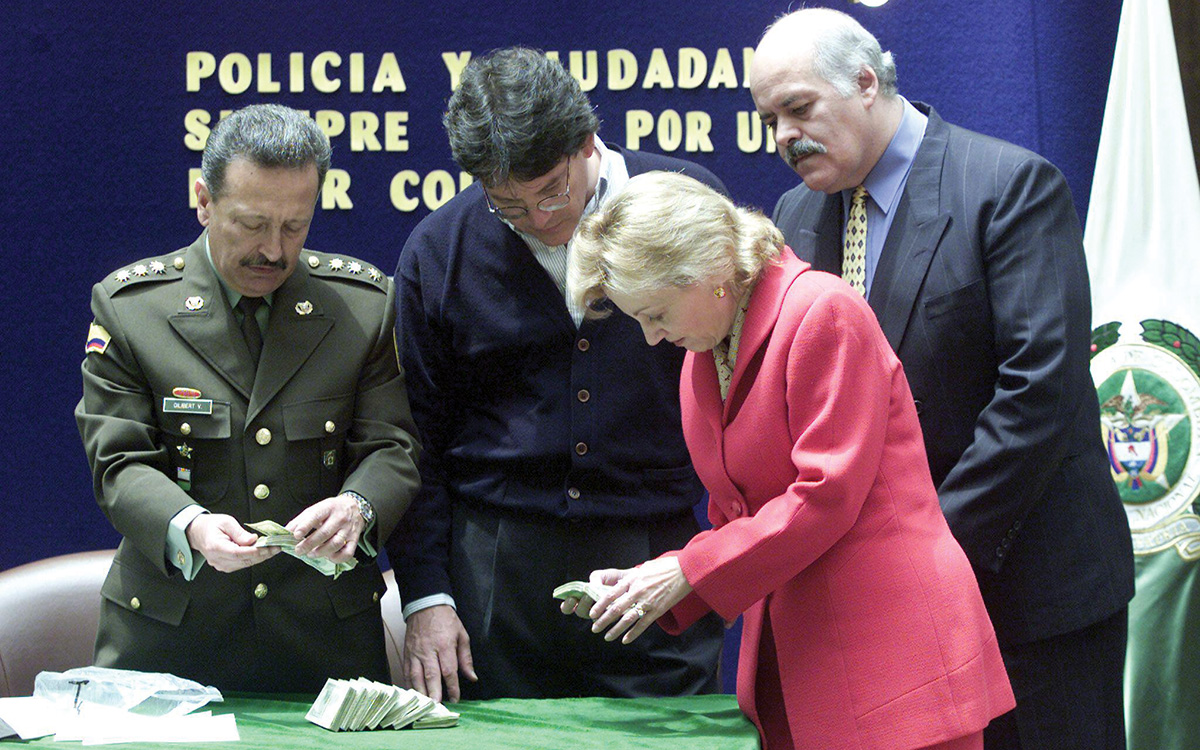
On Aug. 25, 2001, Ambassador Anne Patterson looks at dollars confiscated by Colombian police in a drug raid in Bogotá, totaling about $35 million. From left: Colombian National Police Chief Gen. Luis Ernesto Gilibert, Defense Minister Gustavo Well, Patterson, and U.S. DEA chief in Colombia Leo Arreguin.
Reuters / Alamy
From 2003 to 2004, Ambassador Patterson was State Department deputy inspector general. She served as deputy permanent representative and acting permanent representative to the United Nations from 2004 to 2005, and from 2005 to 2007 she was assistant secretary of State for international narcotics and law enforcement affairs.
After holding these critical posts, Ambassador Patterson returned abroad to serve as chief of mission in Pakistan (2007-2010), where she navigated the crisis surrounding the removal of President Pervez Musharraf. Then, as U.S. ambassador to Egypt (2011-2013), she led the U.S. mission through the Arab Spring and the election and subsequent overthrow of President Mohamed Morsi. Finally, she served as assistant secretary of State for Near Eastern affairs (NEA) at the Department of State from 2013 until 2017, when she retired with the rank of Career Ambassador after more than four decades in the Foreign Service.
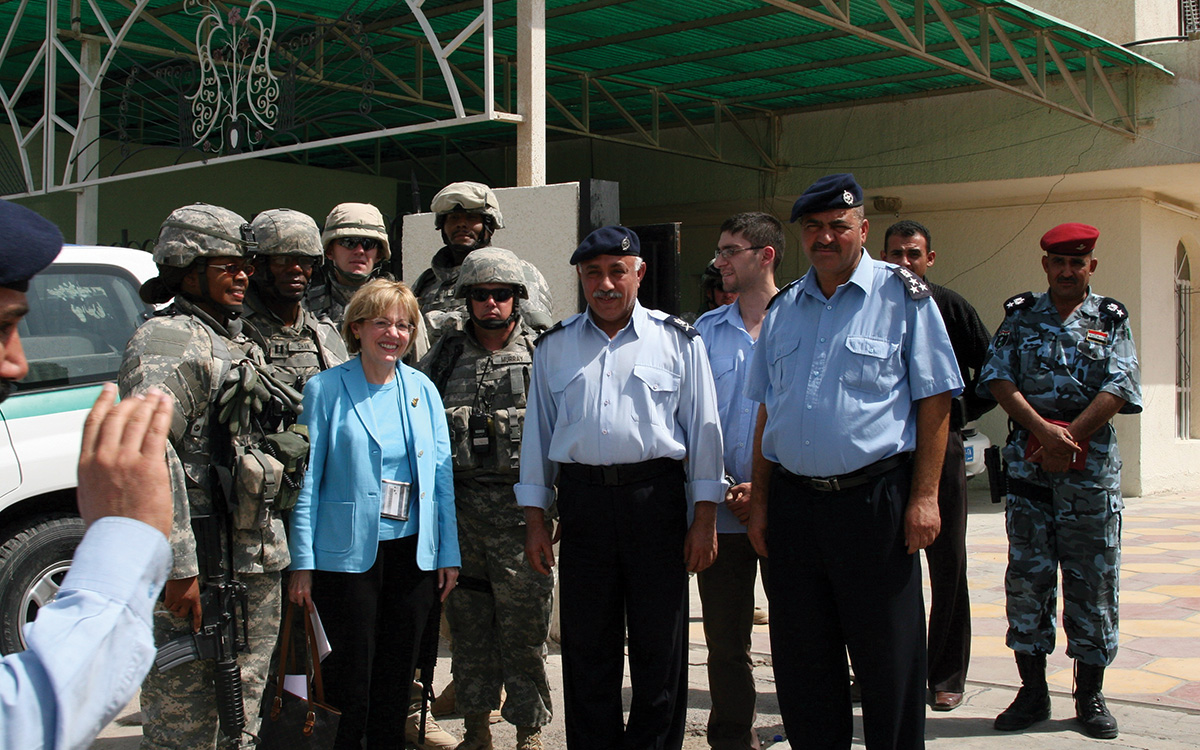
Anne Patterson, then assistant secretary of State for international narcotics and law enforcement affairs (INL), visits a police station that INL was assisting in Iraq, Aug. 13, 2006.
Courtesy of Anne Patterson
Throughout her career, Ambassador Patterson has been a pathbreaker and an example of what a career of service means. A model of the best nonpartisan traditions of the Foreign Service, she served eight American presidents and their administrations with a commitment to excellence, doing her utmost to achieve our nation’s objectives. She broke through glass and other ceilings and navigated through constant crises during her time as NEA assistant secretary and in all four of her ambassadorial postings. A superb negotiator, she demonstrated confidence and skill in dealing with some of the world’s most difficult leaders and situations.
In the course of her own outstanding career, Ambassador Patterson also trained and brought up several generations of FSOs who looked to her not only as an icon of American diplomacy, but also as a deeply caring and generous leader who never sought the limelight and who never acted as though her advancement should come at the expense of others. One of our best Foreign Service leaders of the past half-century, she is also a beacon, exemplifying what integrity, excellence, and decency look like at the heights of our profession.
Ambassador Patterson was named one of Foreign Policy’s 100 Top Global Thinkers in 2011. She is a two-time recipient of the State Department’s Distinguished Service Award. She received the Department of State’s Superior Honor Award in 1981 and 1988, its Meritorious Honor Award in 1977 and 1983, and a Presidential Award in 1993.
Since retiring from the Foreign Service, Ambassador Patterson has continued to make important contributions to our country and our profession. She has been appointed to two congressional commissions: the Commission on National Defense Strategy in 2017 and the Syria Study Group in 2019. Since 2017 she has taught international relations and diplomacy as a Kissinger Senior Fellow at the Yale University’s Jackson School of Global Affairs. She is a trustee of the Cox Foundation and the current chair of the Board of Directors at the Association for Diplomatic Studies and Training.
Ambassador Patterson is married to David R. Patterson, a retired Foreign Service officer. She has two sons, Edward and Andrew, and two stepdaughters, Rachel and Jessica.
FSJ Editor in Chief Shawn Dorman conducted the following interview with Ambassador Patterson via email in October.
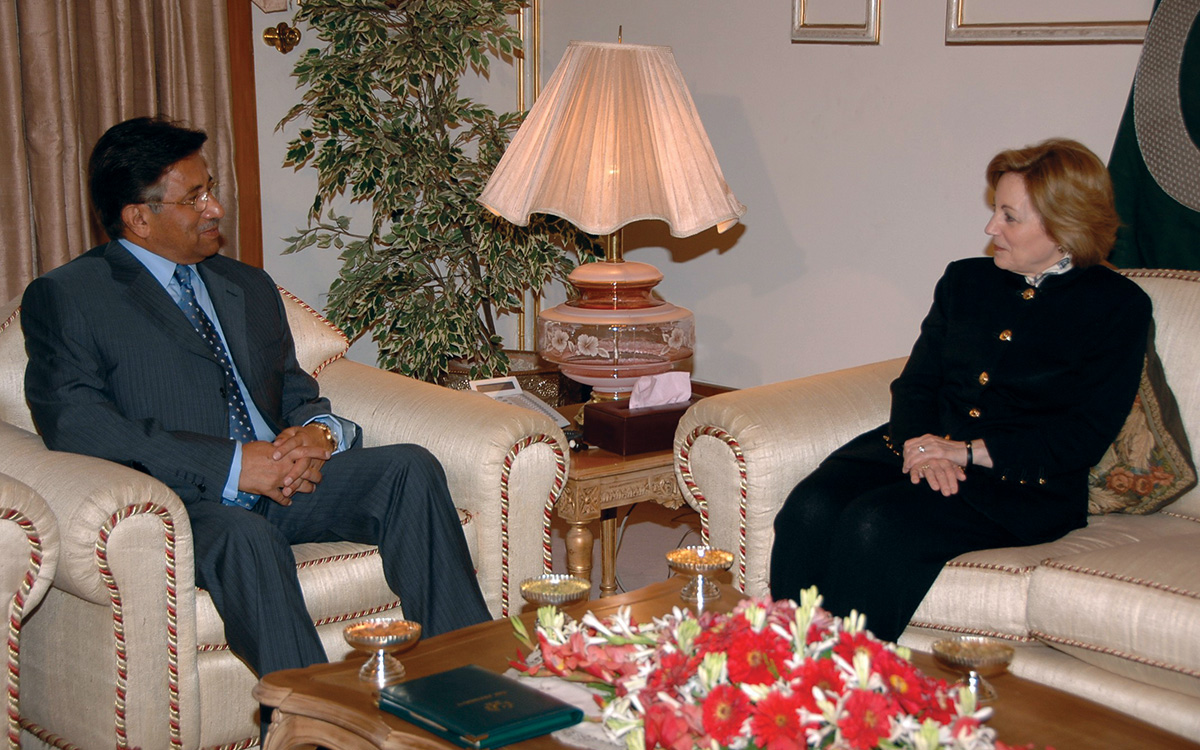
Ambassador Anne Patterson sits with Pakistan President Gen. Pervez Musharraf after presenting credentials, July 31, 2007.
Courtesy of Anne Patterson
ON BECOMING A DIPLOMAT
FSJ: What led you to join the Foreign Service?
Ambassador Anne W. Patterson: My mother saw an advertisement in a magazine that said “The Foreign Service needs women” and provided information on the upcoming test. She told me, “You’re not doing anything. Go take this test.” So I did, and I joined the Foreign Service in October 1973.
FSJ: What was notable about joining the Foreign Service in 1973? The unofficial policy that women had to resign if they married was dropped around that time. Was that, or the general call for opening up more opportunities for women in the Foreign Service, a consideration for you?
AWP: Well, the Foreign Service was advertising its interest in hiring more women, so that was certainly a factor. At some point in the recruitment process, I called up the woman in charge of this effort and spoke to her. There were still a number of restrictions in the early 1970s on what women could do. But there were dramatic improvements in the career possibilities for women over the next 40 years, and women like me owe a lot to some of the pioneers.
The 1980s was a decade of considerable change for women in the Foreign Service. Women also received a huge boost early in the term of Secretary James Baker and Deputy Secretary Larry Eagleburger in 1989, when each bureau was told to select a female deputy assistant secretary (DAS). Not only did women receive jobs they had probably been denied in the past, but the “woman DAS” policy placed women in enough jobs, in enough different fields, so that it was clear that they could do any job the State Department had to offer. It meant that women began to reach critical mass in department leadership jobs.
FSJ: What do you recall about the orientation and training of that time? How many women were in your A-100 class?
AWP: There were four of us, and I was the oldest at 23. We were treated well by colleagues. Our supervisors made a point of having women like Ambassador Melissa Wells come talk to our class, and she made a big impression on me. Ambassador Wells is the only speaker I can remember after all these years. The training was fun and not overly serious.
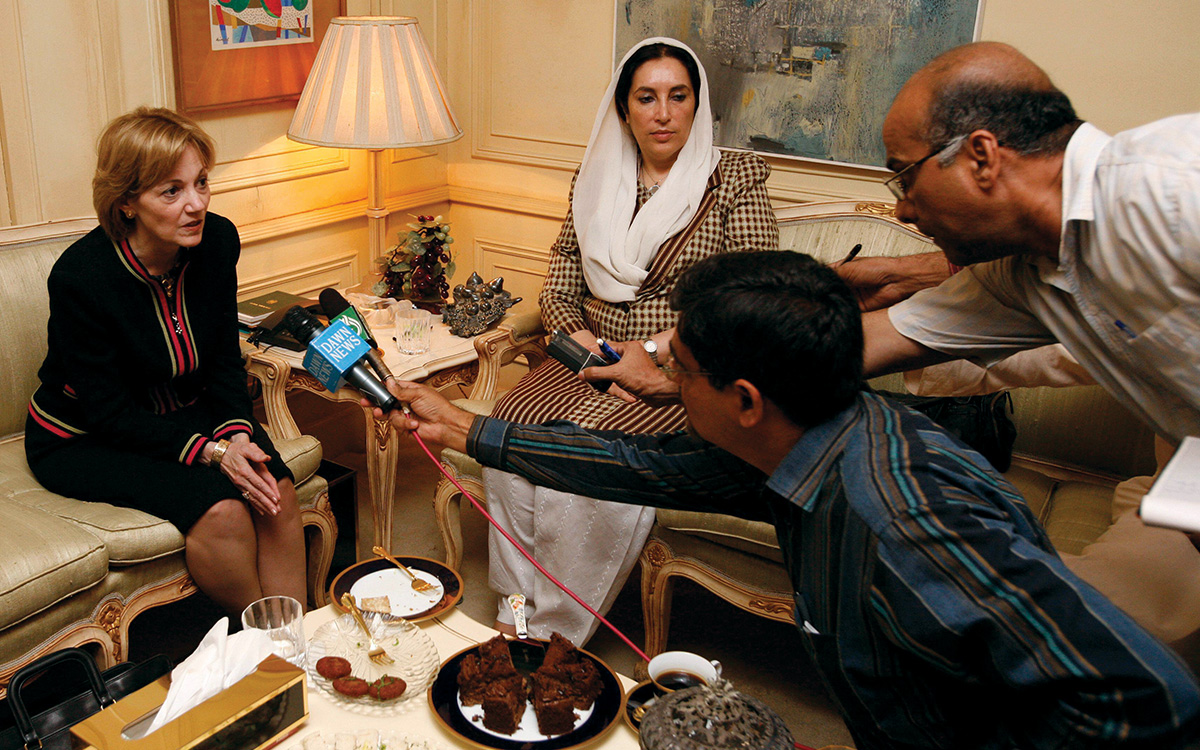
Ambassador to Pakistan Patterson answers questions from the press during a meeting with former prime minister and then–opposition leader Benazir Bhutto at her residence in Karachi, Nov. 19, 2007.
Reuters / Alamy
GLOBAL ASSIGNMENTS
FSJ: What was your favorite posting and why?
AWP: Bogotá was my favorite posting because I thought the United States made a difference with Plan Colombia. U.S. policy fundamentally turned around Colombia’s trajectory, reduced violence, and set the stage for an economic boom.
I learned a lot when we served in Saudi Arabia for four years in the mid-1980s. I was the economic counselor. It was a great opportunity to observe excellent embassy leadership and learn from them. And, unlike Latin America, it was also important to live in a society that was entirely alien to our own.
Pakistan was my most interesting post. It was the most strategically important post I served in during my career. But it was a difficult country to understand. I had no experience in South Asia and was blessed to have two deputies who understood the region, Peter Bodde and Gerald Feierstein.
I also had two multilateral posts, one in Geneva and one in New York. In both places, the U.S. had excellent political ambassadors. The Foreign Service needs to put more stress on multilateral experience.
FSJ: You served as State Department deputy inspector general from 2003 to 2004. Was that a well-functioning office at that time? What was the job like, and why is the Office of Inspector General (OIG) important?
AWP: Being in charge of the OIG was my first experience working predominantly with civil servants, and it made me appreciate the rank-in-person system of the Foreign Service, as opposed to the rank-in-job system in the Civil Service. Unfortunately, in the Civil Service system, it is hard to get promoted and recognized, which has a predictable impact on morale.
Most Foreign Service officers know the OIG by the regular inspections, but an important role of the OIG is to audit the huge financial activities of the State Department. The inspections, however, do identify problems and, ideally, provide suggestions for improvements.
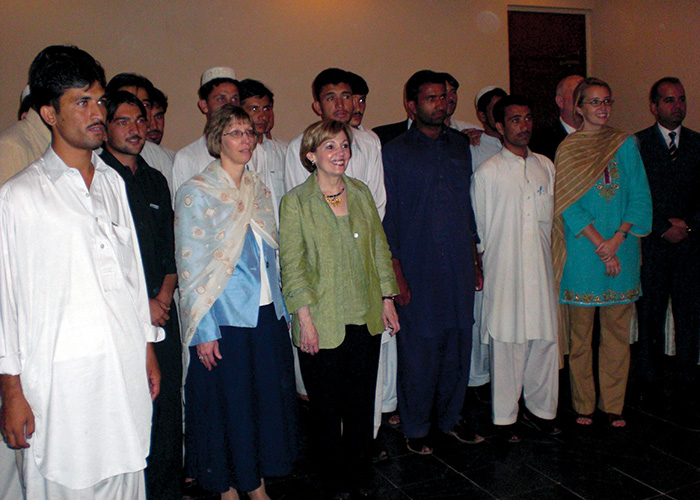
On June 11, 2008, Ambassador Anne Patterson (center) visits with Consul General Lynne Tracy (to her right) and staff at Consulate General Peshawar.
Courtesy of Anne Patterson
FSJ: You have served in tough places at tough times. Can you tell us about what it was like serving as ambassador to Pakistan (2007-2010)? How did you navigate trying to maintain good relations with Pakistan while putting pressure on the government to deal with Taliban and al-Qaida operating in the country, among other challenges?
AWP: It was easy to establish and maintain personal relations with Pakistanis, who are among the most hospitable and friendly people on earth. But an American diplomat develops personal relationships not just to have friends, but to persuade foreign leaders to take steps in furtherance of U.S. interests.
Years ago, I got some good advice from a former ambassador. He told me foreigners must hear the bad news from you, the sitting ambassador in their country, and not some disembodied voice over the phone from Washington. I always tried to follow that. A good relationship can get you in the door, even if a foreign leader does not want to hear what you have to say. With all foreigners, you have to be polite, humble, and persistent, and make clear that you understand their point of view.
Let’s be clear, though. The United States was a uniquely powerful country during most of my career, so most foreign decision-makers were always willing to engage with Americans.
FSJ: You were ambassador to Egypt during a time of violent turmoil there (2011-2013), including the ouster of President Mohamed Morsi of the Muslim Brotherhood, following mass protests less than a year after President Hosni Mubarak was ousted. What were your biggest challenges leading U.S. Embassy Cairo at that time and your most significant achievements?
AWP: Cairo had been the largest and best-staffed embassy in NEA [the Bureau of Near Eastern Affairs] for years. We had outstanding professionals. Unlike many other NEA posts, dependents were allowed, which meant we could attract a broader range of employees.
The United States pushed hard for a democratic transition. But it led to a fundamental dilemma, which the U.S. increasingly confronts overseas. How does the United States respond when Americans—and in the case of Egypt, many of our allies—support democracy but profoundly dislike the results of elections?
I certainly made mistakes. I pushed too hard to have American civil society groups engage with Egyptians. I was unable to develop the relationship with President Morsi that I had developed with other leaders in other countries.
FSJ: During your time as ambassador to Colombia, you kindly agreed to be the ambassador profilee for AFSA’s 2003 book, Inside a U.S. Embassy: How the Foreign Service Works for America. The U.S. was undertaking the huge, interagency, complicated, and controversial drug eradication and counterinsurgency program, Plan Colombia, at that time. How did you manage a U.S. mission that had become the largest in the world? What was the primary lesson from working on that program, which is largely deemed a success story today?
AWP: The implementation of Plan Colombia was unique in my career. It was successful because leaders like General Barry McCaffrey and Under Secretary of State Tom Pickering kept everyone focused on the plan’s objectives, and the relevant assistant secretaries worked extremely well together. Interagency disputes were not tolerated, and decisions were made quickly. The Colombians were a fully engaged partner. Everyone worked hard to ensure congressional support and to sustain the funding. The Colombian ambassador in Washington was the absolute best.
Importantly, Plan Colombia was always considered a long-term effort that would take years to produce results, a good example of the strategic patience the U.S. needs in many other places.
The embassy itself was easy to manage because all agencies sent first-string representatives because of the priority of the program in Washington. The State section chiefs were first-rate. I fear Plan Colombia could not be replicated today, because our government is just too fragmented.
FSJ: What opportunities and challenges did you face as assistant secretary for Near Eastern and North African affairs, your final active-duty assignment? What are you proudest of accomplishing?
AWP: Well, the accomplishments were few and far between. NEA was mostly crisis management in the wake of the War on Terror and the Arab Spring, which had caused widespread unrest throughout the Middle East. Much of the bureau’s time was spent mitigating the effects of the civil war in Syria, the civil war in Yemen, and the spread of the Islamic State of Iraq and Syria (ISIS).
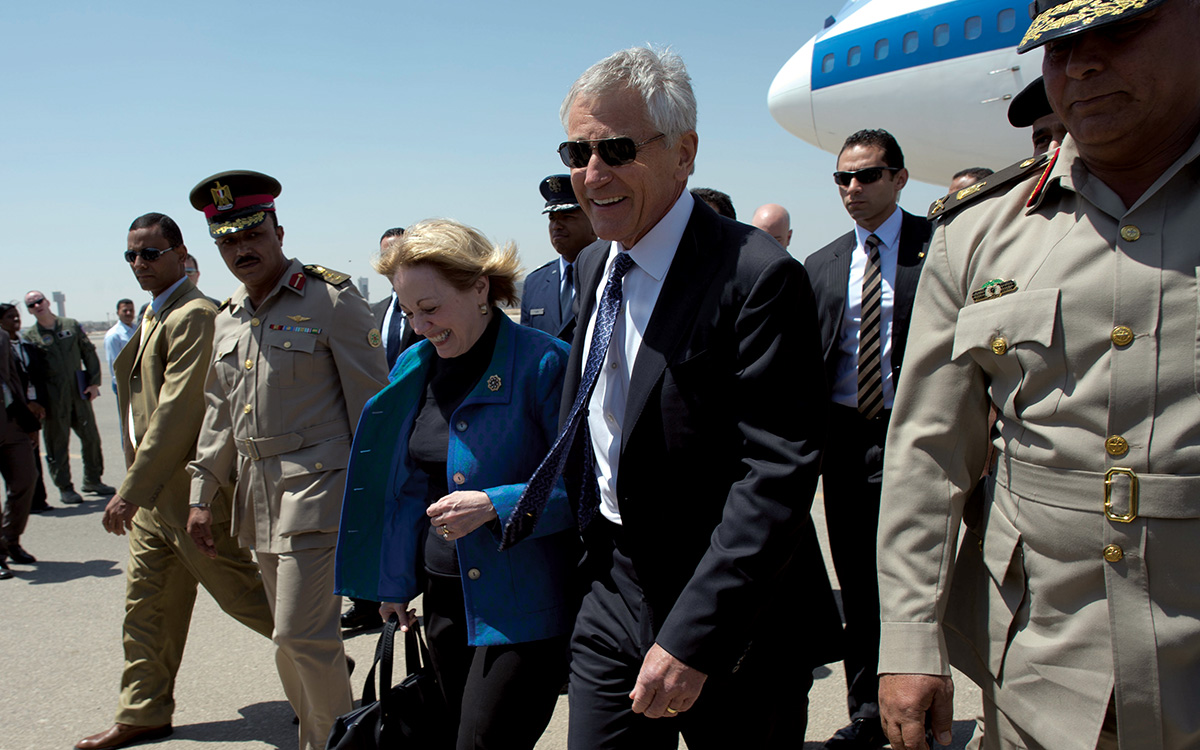
Ambassador Patterson walks with Secretary of Defense Chuck Hagel upon his arrival in Cairo, Egypt, April 24, 2013.
Department of Defense / Erin Kirk-Cuomo
ON RISK MANAGEMENT
FSJ: In your 2019 article “We Have to Be There” you argued: “We can’t prevent conflicts, export our products, protect our citizens, or improve human rights if we aren’t there. Staying safe cannot be our highest priority. Our highest priority must be to advance the interests of the United States with a knowledgeable, aggressive, and consistent presence overseas.” As part of his modernization effort, Secretary Antony Blinken says he wants to prioritize risk management (as opposed to risk avoidance). Do you think the State Department has made progress in this area since you wrote that? What remains to be done?
AWP: I know there has been a lot of debate about getting our people back into the field, but progress has been slow. U.S. embassies for Yemen and Libya are still located in third countries; the American consulate in Basra is still closed. Embassies in the Horn of Africa were drawn down because of regional conflicts. Kyiv was reopened with a limited staff under considerable congressional and public pressure. If anything, COVID-19 aggravated our withdrawal from the world as staffing was reduced. Now it takes 857 days to get a tourist visa in Bogotá, arguably one of our closest allies, with predictable impacts on business and tourism. So we are not only not getting our people out to talk to foreigners but also not facilitating routine tourism and business travel, as well.
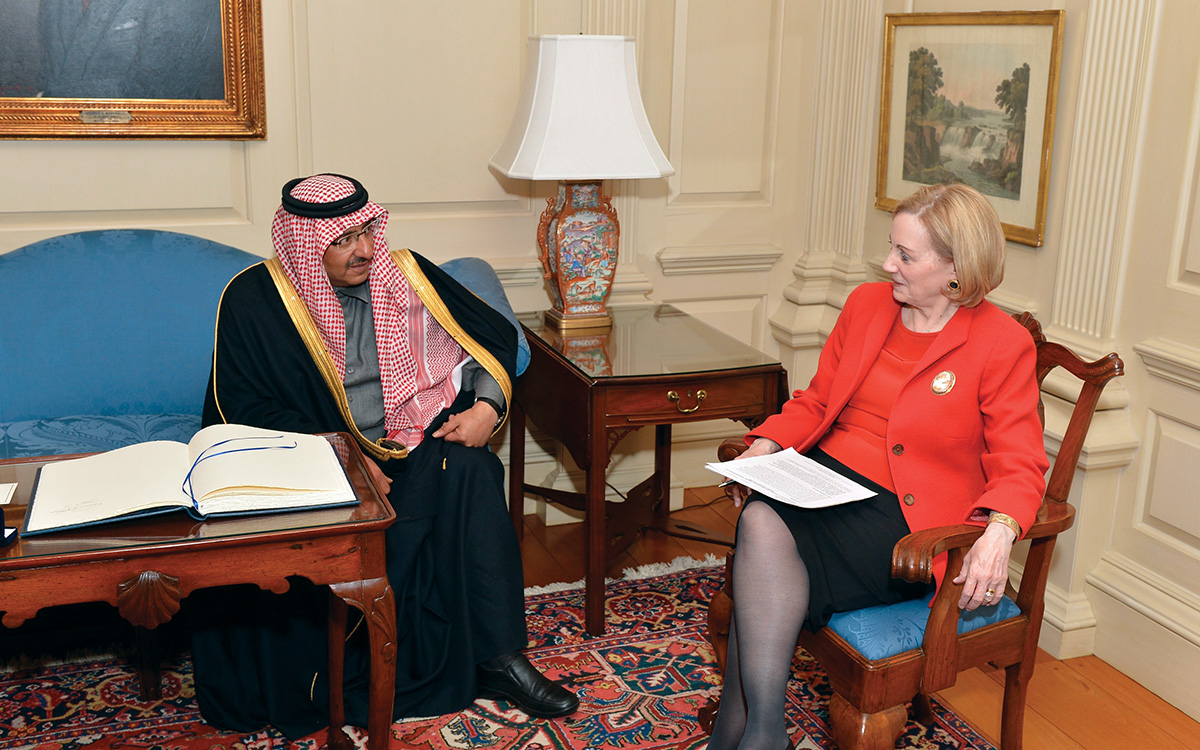
Assistant Secretary of State for Near Eastern Affairs Anne Patterson meets with Saudi Interior Minister Mohammed bin Nayef at the State Department in Washington, D.C., Feb. 11, 2014.
Department of State
ON THE PROFESSION
FSJ: When did you first join AFSA?
AWP: I joined in 1981. I was on the Governing Board for a while in the mid-1990s.
FSJ: How can AFSA provide the most value?
AWP: AFSA has been instrumental in securing rights and benefits for the Foreign Service in Congress and in the State Department. It provides a venue to address personnel changes, reform, and issues of fairness, like raising money to cover legal fees for members. AFSA’s attorneys provide important balance in the system when they assist employees with grievances or disputes.
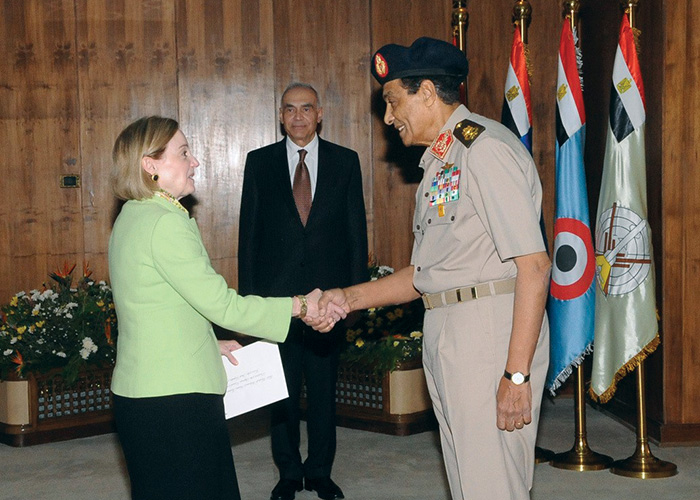
On Aug. 17, 2011, U.S. Ambassador to Egypt Anne Patterson presents her credentials to Field Marshal Mohamed Hussein Tantawi, who ruled Egypt for 17 months after Mubarak stepped down.
Courtesy of Anne Patterson
FSJ: As you know, AFSA also honors dissent within the system through these annual awards. What has been your experience with dissent? Any advice for colleagues on when and where to dissent?
AWP: As I reached more senior positions, I found that the Secretary of State or the president would almost always listen to dissenting views. Take the case of Syria: Secretary [John] Kerry consistently argued with President [Barack] Obama for a change in policy, and Secretary Kerry always had a hearing. But President Obama was determined that the U.S. was not going to enter another conflict in the Middle East.
The most valuable dissent messages are reasoned, unemotional explanations of why the policy needs to change. You would be surprised how seldom a disagreement with policy is seriously focused and articulated, as it is in a dissent message, instead of just voicing complaints in late-night office conversations. If anything, dissent is probably a career enhancer since, done correctly, it will increase the visibility of the officer.
In my view, a related aspect of a dissent process would be a system to evaluate what went wrong and to learn from our mistakes. The State Department does not do this—unlike the U.S. military—because of potential embarrassment. What happened during the evacuation of Afghanistan? In Iraq? In Egypt? In the Horn of Africa? What can we learn from these events? And, just as important, when crisis situations are favorably resolved, what did we do right?
FSJ: What is the essential ingredient for a successful diplomat?
AWP: A successful diplomat should be able to develop relationships with foreigners, to understand their environment, and to attempt to influence them. Ideally, she or he will talk to foreigners in their own language. A successful diplomat is an equitable manager of physical and personnel resources. Increasingly, a successful diplomat has to spend time with Congress to advance the policy, since Congress is not only a source of money but also of foreign policy expertise and influence. A successful diplomat needs to have a thick skin. And, finally, a successful diplomat needs to understand the environment in Washington. Of course, no one can be all things to all people, which is why you need a team with a mix of talents and to recognize your own shortcomings.
FSJ: Your nomination says that a frequent comment from people who have worked for you is that you are simply the best leader they have worked with in their careers. What makes a great leader in the Foreign Service? What tips do you have for aspiring leaders?
AWP: I am gratified to hear that. Surveys show that what subordinates want most is someone who makes decisions. That gets easier as you get more senior. Trust your instincts. You will mostly get it right. Give subordinates a lot of running room.
The State Department is full of smart, dedicated people with good judgment, and they don’t like someone monitoring their every step. One of my problems as a leader was that I tended to bypass marginal performers and not try to improve their performance. Instead, I just gave the work to the superstars. When I was a counselor, one of my DCMs [deputy chiefs of mission] really worked with me on this personnel management problem, as well as discouraging me from consulting him every five minutes. In one of my ambassadorial posts, I saw a counselor absolutely transform one of his marginal performers into a highly productive member of the embassy instead of tending to write her off as I would have done. So you have to work always on your leadership shortcomings.
LOOKING AHEAD FOR DIPLOMACY
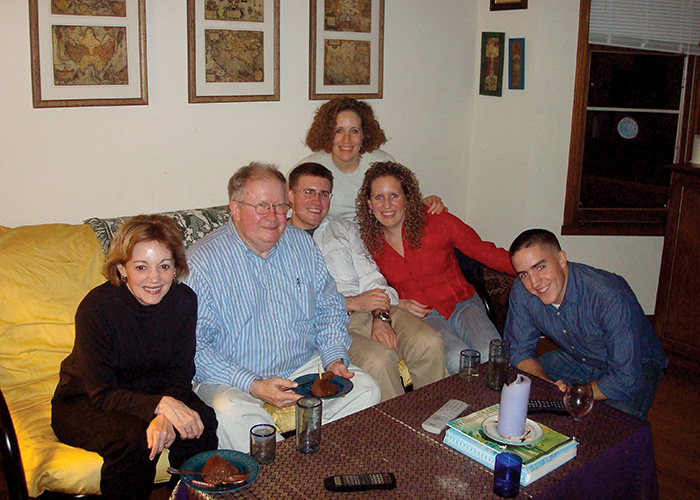
The Patterson family gathers in the U.S. during Anne Patterson’s tour as U.S. ambassador to Pakistan, 2008. From left: Anne Patterson, husband David Patterson, son Edward Patterson, stepdaughter Jessica Patterson Long (currently chargé in Namibia), and son Andrew Patterson. In back, stepdaughter Rachel Patterson.
Courtesy of Anne Patterson
FSJ: Every administration comes in with new ideas for reforming the State Department and the other foreign affairs agencies. And yet, sometimes it feels like moving the chairs around. What are the most critical reforms needed?
AWP: The most important institutional and cultural reform, I believe, is overcoming the aversion to risk so we can find out what is taking place in foreign countries. But the most important operational reform is increasing the State Department’s ability to surge. The recent reform agenda prepared by Arizona State University and several distinguished retired officers [the American Diplomacy Project—Phase II] lays out legislative language to get this done. If we had this capacity, we could have responded more effectively in Afghanistan, Libya, Yemen, Iraq, and many places in Africa. We could backfill existing staff, so it does not take three years to get a visa in some posts. We might also be able to address some of the long-standing issues with work/life balance.
FSJ: What issues would you point to that will require increased focus for American diplomacy in the coming years?
AWP: Our international position is not as strong as it was 20 years ago. Being an American diplomat was not hard because we represented the sole remaining superpower, and everyone had to listen to us. But now, we will need to up our game. We need more and better language officers, people who really speak hard languages and can conduct business in them. In most places, we are too dependent on talking to English-speaking elites. We need longer tours, so our officers really understand countries that are profoundly alien to Americans, like China, Pakistan, or Saudi Arabia. The Foreign Service needs a better grasp of international economics: how to articulate debt, sanctions, climate change, energy policy, competition from China, etc.
FSJ: What is your advice to current members of the Foreign Service who may be considering leaving the Service?
AWP: It depends on why they are leaving. Some leave because the financial rewards are too good to pass up. If an officer is dissatisfied with promotions or assignments, I would usually advise them to stick it out for a while. Careers often go through slow patches.
FSJ: Do you recommend a career in the Foreign Service to young people today? Why or why not?
AWP: I often speak to female students. I urge them to join the Foreign Service. There is no greater honor than representing the United States, which despite all our problems remains the gold standard for the rest of the world. The work is endlessly interesting. But the Foreign Service is not for everyone. It is hard on family, and we have never really resolved the issue of spousal employment. We have also never really resolved how to balance out the workload. Yes, you can take a two- or three-year job with shorter hours; but to really advance, you have to be prepared to put in a lot of hours.
For instance, if you are currently working on Ukraine, you need to be available seven days a week. The system is just not flexible enough to deal with crises, so we work our people really hard.
FSJ: Are you optimistic about the future of professional diplomacy?
AWP: Yes, because I am fundamentally optimistic about the future of our country. But our international position has shifted, and our Service must evolve with it. Fortunately, a lot of analysis has been done on readying the Foreign Service for these new challenges, but it needs to be implemented.
When sharing or linking to FSJ articles online, which we welcome and encourage, please be sure to cite the magazine (The Foreign Service Journal) and the month and year of publication. Please check the permissions page for further details.








